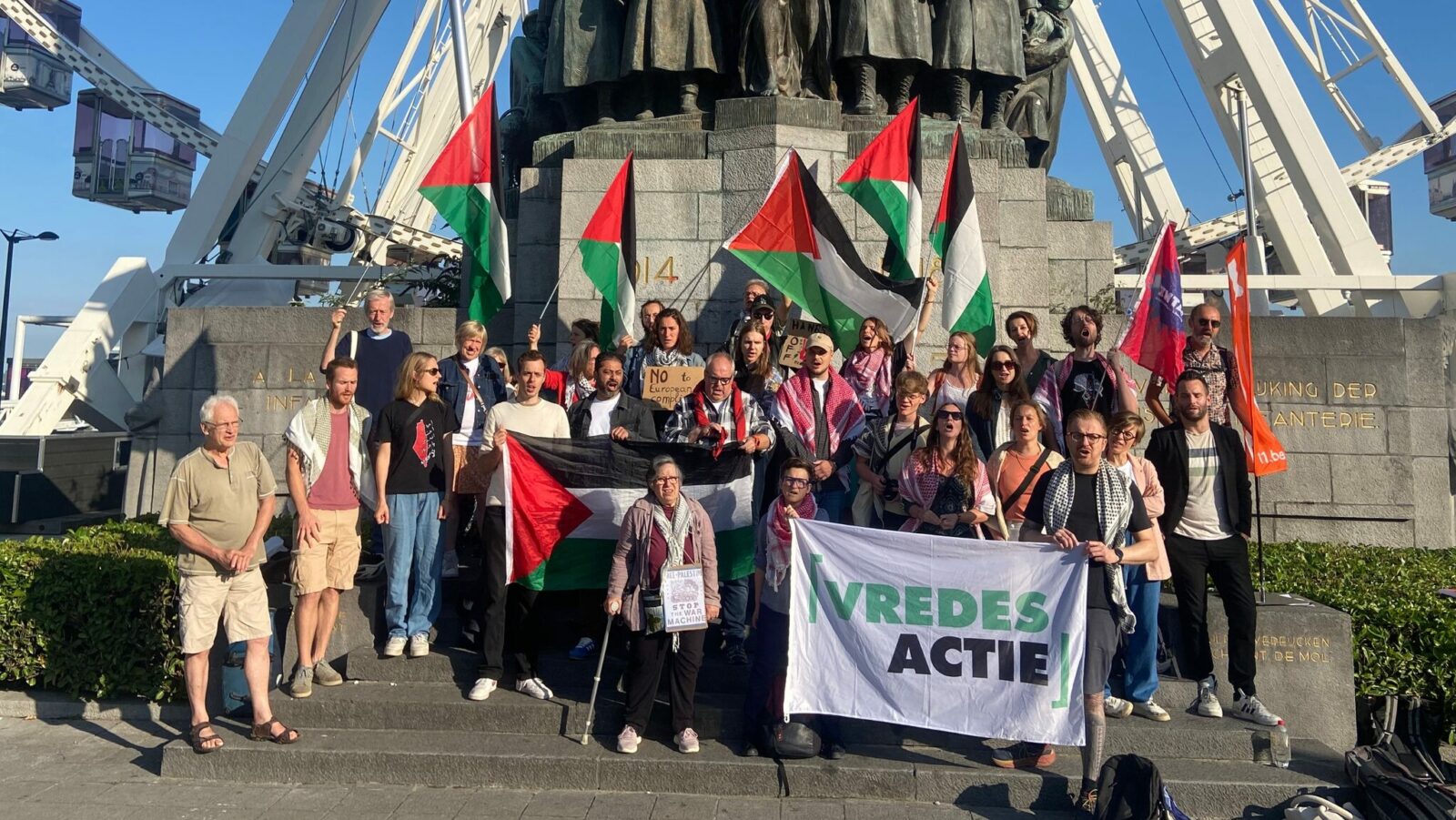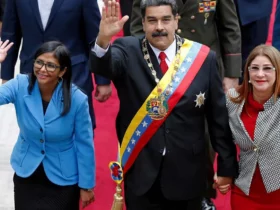Interview with Lichen Ullmann, coordinator at Vredesactie.
Interview with Lichen Ullmann, coordinator at Vredesactie.
Conflict and militarization is advancing in the policies and practices of the European Union and NATO. But social resistance is also increasing. We spoke about the political context of militarization, its connection to Israel and actions against it with Lichen Ullmann, coordinator of the Vredesactie, a Belgian NGO struggling against militarization.
Where do you see the political context of militarization in Europe?
I think one of them that’s really in the news right now and that’s really important right now, I should say, is what’s happening on the front between Russia and Ukraine.
There was an agreement that actually there would be a buffer area between Russia and Ukraine. and EU, let’s say, and Western Europe. But actually, NATO decided to extend the potential to join NATO to Georgia and Ukraine, which led to Georgia being invaded and also Crimea being invaded and also now Ukraine. And now the rest of you can remain seated. When I say led to, I don’t mean that there’s no shared responsibility.
I mean each party has its own shared responsibility, but there was a clear decision from NATO to say that they would extend membership. Now, we should also remember that when this happened, Angela Merkel and Nicole Sarkozy, who are not left -leaning whatsoever, not progressive whatsoever, said this was a bad idea because it would provoke conflict. Now, we should also be clear that armed invasion is not the same as multinational agreements and breaking or disengaging from multinational agreements, but we should make sure that we’re taking these things into consideration and the narratives that we’re sharing about how we want to incorporate our spheres of influence have an impact. And we’ve clearly seen that.
NATO has also used the guise of self-defense to attack many countries, places, most notably Iraq. We saw that there were no weapons of mass destruction. This is clearly an imperialist organ, and we should be making sure that we’re naming those things.
I also think it’s really important to think about when we think of hegemony and the idea of self-defense. This argument for self-defense is repeatedly used as cover for imperialist attacks on other countries. I think it would be remiss if I don’t name Israel in this.
Israel is continually funded in terms of arms by the US and by the EU. Israel is involved in military cooperation with the EU and with EU countries. In 2023, Germany bought an air defense system from Israel for more than, I think, $3 .7 billion US dollars. That makes also Germany dependent on Israel for its so -called defense. I think we should really question the idea as well.
Does Germany actually need an air defense system is one question. But then, who are you getting in bed with when you’re looking at your weapons? It makes you dependent on those countries, which makes it also more difficult to stop trade with them. And we saw that Merz is refusing to stop the trade agreement with Israel, which is just heinous. The same goes for the US.
Israel exported more than $13 billion worth of arms in the last year, and more than half of that came to the EU. So it’s not just Germany, and I think that’s important for us to remember. So we’re supporting imperialism through our purchases and also through our exports. So we don’t only export weapons, we also buy them. So we need to have a double arms embargo. And that’s one area where we need to sharpen up our language and our demands.
How can a strategy be developed against militarization?
I think that the fact that there’s an interdependence across economies and across military and, let’s say, sectors give us also opportunities for how we can actually make some massive wins and also change things. And one of those things that we can really work with is the playbook. We know the playbook of the industry, we know the playbook of the government, we know the playbook of the far right. They’re not very different from each other. They create and demonize an enemy, very often other, very often somebody or a group that’s racialized or different in terms of religion.
Unfortunately, humans are, it’s easy to create fear. And governments work off the basis of fear in order to argue that they need to defend the population and then get back against its own population. We see this also in the US, where I’m from, where Trump has sent in the army against his own population. And it’s really his own population, and they use the argument that some people are not part of the population. Again, heinous. Governments refuse to acknowledge the complexity and the diversity of opinions and peoples.
I think we can really work to build a larger social movement. And this is not a unified movement, but actually how do we work together with people we disagree with? How do we build narratives? The vision of the world that we would like to see that actually touches people who are in a broad reach of society. I think a lot of people want to have a good life, a decent life, where they can feed their family, where their kids can have a good education, where they get enough to live on when they’re old and want to retire. And this is true across the world.
Here we can lean on the concept of human security from the United Nations, which goes broader. We shouldn’t be thinking of peace as the absence of war. We should be thinking of peace as the basic needs, where there’s social justice for everyone and people’s basic human needs are accounted for everywhere in the world. We should be thinking about how everybody’s individual rights, no matter where they are or who they are, should be the same. We should be thinking about how we can stand in solidarity with those most affected and things that are being led by those most affected. So, for example, the Boycott, Divestment, and Sanctions movement is a great example here, because it’s Palestinian-led.
There are 170 different Palestinian organizations behind it, and it’s very concrete, very strategic, but also diverse enough to allow for folks in different parts of the world to get behind it and to act in. And then, on some very specific ideas, look at the laws that are in place in your specific country. So, in the organization that we work for, we are finding where the government is in breach of its own rules regarding arms exports and taking them to court. We take the companies to court, and we’re looking against the weakening of rules to export arms. Because obviously with the rules we have now, we’re still not doing a good job because we’re still sending weapons to places like Israel. So we need to make sure that we can stop that.
What’s going on in Europe in terms of resistance against policies of militarization, concretely, practically?
Today we’re seeing a great resurgence in activism against militarization and against imperialism and against genocide. We’re seeing an immense solidarity. We’re seeing an immense rise in solidarity against the weapons that are being used on civilians in Gaza, for example, elsewhere in the world as well.
And we’re seeing people taking action to prevent and to block arms being exported or composites of arms being exported to kill people.
Can you give us an example from here, Belgium? Something that happened here recently?
So, people have blockaded arms factories, they’ve done demonstrations in front of arms factories, they have written petitions to the government to prevent the government from exporting weapons and from making sure that the government is using and enforcing its own laws against because here in Belgium since 2009 there’s a law, or I should say an agreement between the different responsible governments to prevent the export of weapons and of composites of weapons to Israel. The government isn’t always following, making sure that this is enforced. There’s a really strong rise in legal work and also in activism work to prevent that from happening. So you see people doing public resistance, demonstrating in front of arms factories, for example, doing blockades, and you also see legal avenues, whether it’s petitions to the governments or taking the governments or the companies to court.
What do you expect to happen in the future, given that there will be probably more militarization with the NATO decision? What do you expect in terms of social activism to happen in the future given these policies of militarization?
I think we’re seeing that people are coming together more and more to work against things that demonize others. There’s a very strong understanding and this has grown over time that we need to be in solidarity with each other. We need to stand up for the people who are most affected while following their lead. We need to work together across class, across different topics, across different issues, across different countries, and we’re creating more and more links with each other.
And this will enable us to hopefully live in a world with more peace and more understanding for each other.
















Leave a Reply